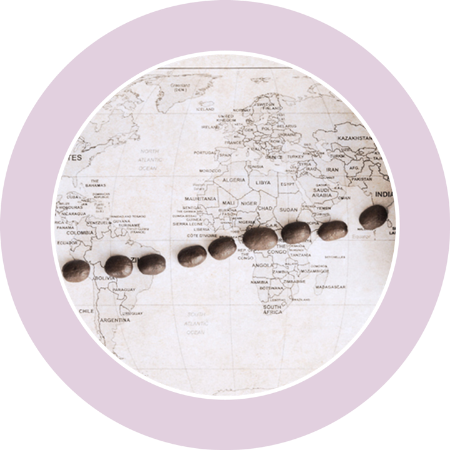There are a couple of versions of the coffee's journey, starting with goats in Ethiopia and extending to Sufi dervishes, spreading from the Ottomans to Europe and the rest of the world. There's no knowing which one is true.
But as far as we understand, what happened to coffee more recently is the same as what happened to every industrialized food there is.
There was no such thing as organic food.
Perhaps the motivation of the Green Revolution that began in the ‘50s was feeding the growing population. But at this point in history, agricultural production is possible even without soil or sunlight.
(Here is the link to an article, if you’d like to read it. But heads up, it’s in Turkish.)
Think about it: A child who did not grow up in his mother's womb, who is constantly provided with food, water, and medication to keep him healthy but who lives in complete isolation from birth to death without the affection of his family. Sounds like a scene right out of The Matrix, doesn't it?
The need for organic food appeared because the production conditions of this new food did no good.
Beyond organic...
Once you intend to improve the conditions, the sky is the limit. Only growing a product in the right season and in the right region, prioritizing local resources, looking out for the carbon footprint, paying fair wages, providing equal opportunities for workers, disturbing the earth as little as possible, and even restoring it. Looking out for not just the earth but the entire ecosystem of people, animals, trees, water, plants, fungi, and all other living things. It's a great philosophical debate where there isn't a single truth at any given moment.
Coffee had its share of the Green Revolution. Coffee, which was previously shade-grown in the shade of banana and other fruit trees, underwent changes in the '70s and '80s. In order to increase production, the US Agency for International Development (USAID) provided $ 80 million in aid to farms in Latin America to facilitate the transition to technified agriculture. As a result, other trees were cut down so that coffee trees could get more sun and improve their yield; fertilizer and pesticide use increased; forests disappeared, soil and water became polluted, and yield gradually suffered. Of the 50 countries with the highest deforestation rates between 1990-95, 37 were coffee producers. (Wikipedia, Economics of Coffee)
Although the criteria for specialty coffee are being debated, there is a minimum of 3 rules accepted by international organizations. Coffees that satisfy these criterias are known to be among the highest quality coffees in the world and certified as Specialty Q Coffee:
- Harvesting ripe fruits only. According to the most up-to-date figures on the International Coffee Organization website, daily coffee consumption in the world is about 27 thousand tons and 2.2 billion cups of coffee (Wikipedia Economics of Coffee). When manual harvesting could not meet this demand, trees suitable for machine harvesting were grown. These cannot be used everywhere and require certain geographical conditions. They are used in Brazil, where most coffee is grown. However, machine-harvesting means picking all fruits, regardless of whether they are unripe or rotten. Which means a drop in quality in comparison to hand-picking.
- Scoring 80 points or above on the 100-point Q scale. Just like wine sommeliers, coffee also has licensed graders. Q graders certified by the Coffee Quality Institute (CQI) evaluate coffee beans as per the standards and protocols issued by Specialty Coffee Association of America (SCAA) for the following attributes : aroma, acidity, flavor, body, aftertaste, balance, uniformity, clean cup, sweetness, overall and give the coffee a grade out of 100.
- Less than 5 defects in 350g of coffee. Stones, soil, and unripe or rotten beans are considered as defects.
Keeping up with the demand for coffee with specialty coffee is not possible. Just like with everything else. Because specialty coffee requires more labor, does not grow everywhere, and therefore is more valuable. Which is why brands that operate on an industrial level do not go for specialty coffee.
We'd love for you to try specialty coffee




